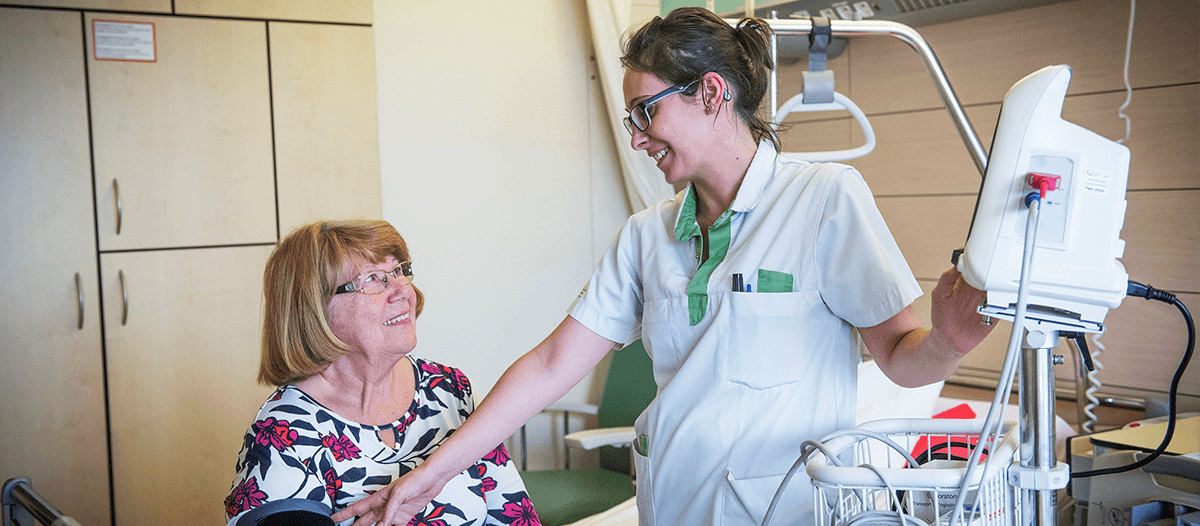Thanks to ePact and Trend Micro IT-security of UZ Brussel is up to speed again
UZ Brussel University Hospital, located on the Jette campus, is one of the most important hospitals in Belgium with 721 beds. It was founded by the Vrije Universiteit Brussel (VUB) and several polyclinics at various locations on the outskirts of Brussels are attached to the hospital. These are also supported for various services – including IT – from UZ Brussel.

UZ BRUSSEL
UNIVERSITY HOSPITAL
UZ Brussel University Hospital, located on the Jette campus, is one of the most important hospitals in Belgium with 721 beds. It was founded by the Vrije Universiteit Brussel (VUB) and several polyclinics at various locations on the outskirts of Brussels are attached to the hospital. These are also supported for various services – including IT – from UZ Brussel.
WEBSITE
REGION
Europe, Belgium, Brussel
SECTOR
Healthcare
COMPETITOR DISPLACED
MCAfee
TREND MICRO SOLUTIONS
- Apex One Endpoint Security
- Deep Security
- Mobile security
- Cloud App Security for Office 365
- ScanMail for Exchange
ADVANTAGES
- Better protection
- Ease of management
- More insight
- More time to focus on core business
- Insight into all network traffic
- Proactive managed services
OVERVIEW
UZ Brussel University Hospital, located on the Jette campus, is one of the most important hospitals in Belgium with 721 beds. It was founded by the Vrije Universiteit Brussel (VUB) and several polyclinics at various locations on the outskirts of Brussels are attached to the hospital. These are also supported for various services – including IT – from UZ Brussel.
The mission is obviously to provide the best possible care to patients. The UZ Brussel can rely on some 3,800 permanent employees for this. Every year, about 800 students follow an internship in the hospital, because training and research are also important tasks of UZ Brussel. In this medical setting, IT plays an important role.
“As the supporting IT service for infrastructure and operations, we are responsible for the proper functioning of networking, system management, database management and cybersecurity,” explains Robin Demesmaeker, Manager of ICT Infrastructure at UZ Brussel. “In addition, there is also a DevOps team that has developed its own Electronic Patient Record (EPD) system and shares it in partnership with other hospitals, whether or not hosted in UZ Brussel’s data center.”
CHALLENGES
One of the major trends in healthcare is the far-reaching digital transformation. UZ Brussel also sees a number of major challenges in the coming years. . For example, there is theincreasing demand for automation. “Within nursing, we are at the tipping point to relieve people from administration as much as possible. So devices like blood pressure monitors could automatically link the values to the EPR. At present, nurses still have to add them manually,” says Robin Demesmaeker.
He expects that the arrival of5G networks will also bring about an evolution in the monitoring of patients at home. Think for example of diabetics, cardio data or sleep tests. Other trends that create challenges are cloud services and the exponential growth of IoT sensors in the medical world.
“Central to IT security for me is the protection of the identity of the healthcare provider”
Robin Demesmaeker | ICT- infrastructuurmanager | UZ Brussel
All of which also have implications forIT security and privacy. “Central to this for me is the protection of the identity of the healthcare provider,” clarifies Robin Demesmaeker. “Because of his or her position, he or she can access certain sensitive data and perform specific actions. So if his or her identity is not well protected, any rogue person can misuse this data. Especially if you use more cloud services and therefore no longer keep everything within the walls of the hospital, this becomes even more crucial. Like knowing where and how the identity is being used, which you then also have to log.” The tension between user-friendliness for the user and the strictness of the policy is also a challenge for UZ Brussel. “But I am convinced that with minimal adjustments and efforts you can still be very secure.”

WHY TREND MICRO
In addition to these challenges, an outdated endpoint security solution (McAfee) was the concrete reason for strengthening the security. Robin Demesmaeker: “It was purely definition-based and we wanted a next-gen solution. We had defined four criteria: it had to be behavior-based easy to manage – because our time and focus is on supporting healthcare -, the solution had to be able to handle virtualization, and finally we carried out a benchmarking exercise to determine how the security solution reacts to our own medical software.” In a comparative test of four solutions, Trend Micro Apex One emerged as the best.
“Due to COVID-19 hospitals were more targeted by hackers. Trend Micro then spontaneously came and asked if they could help.”
Robin Demesmaeker | ICT- infrastructuurmanager | UZ Brussel
COVID-19
You would think that the case was closed, but then COVID-19 emerged. This caused a lot of pressure internally. Also on the IT department. “The rapid scaling up of Intensive Care was a priority for us. In addition, solutions were quickly sought to enable patients, who were no longer allowed to receive visitors, to communicate with their families at home via video calls on smartphones or tablets. This caused an extra load on the Wi-Fi network.
Teleconsultationswere also used.” Another problem was that due to COVID-19 hospitals were more targeted by hackers. “Trend Micro then spontaneously came and asked if they could help. They then installed a DDI (Deep Discovery Inspector) solution to see if anything suspicious was happening on the network That was a trigger to broaden the original scope and not only include endpoint security but also mobile security,” says Robin Demesmaeker
SOLUTION OF EPACT
UZ Brussel finally opted for a bundle of XDR solutions for users(with Apex One End point security, Mobile Security, Smart Protection for Office 365 and ScanMail for Exchange) and Deep Security for their data center. Robin Demesmaeker: “We also investigated whether we would work with an external partner for a Security Operations Center (SOC). But given that the Trend Micro XDR bundle also includes Managed Services, this was the best option for us. There is 24/7 monitoring with notificationsvia email and a report.”
The implementation of the solution is done in phases. Apex One was completed at the end of October 2020 while other solutions are already largely installed. For the integration and implementation, UZ Brussel relies on ePact, a trusted Trend Micro partner. “We are very satisfied with the service provided. The integration went smoothly, without any problems and all the apps continued to work. A correct implementation is at least as important as choosing the solution itself,” says Robin Demesmaeker
“For us as a partner, Trend Micro’s managed services offering is also very interesting,” says Philip Warrens, managing partner at ePact. “Thanks to the support of Trend Micro with operational tasks, we can focus on the strategic security policies with our customers.”
RESULTS
The overall result is that the digital environment at UZ Brussel is now safer, allowing the IT team to focus on core tasks and leave the rest to Trend Micro specialists. Most visible are the alerts that the IT team now receives from the managed service. “The nice thing about that is that it’s not just numbers. But also recommendations.
“The nice thing about the Trend Micro solution is that it’s not just numbers, but also recommendations.”
Robin Demesmaeker | ICT- infrastructuurmanager | UZ Brussel
Sometimes we get a comment about a user’s behavior. It then reads: ‘Make sure that you raise awareness with this user, because he did action X and Y.’ For example, check the URL he clicked on,’ says Robin Demesmaeker. Thebundle of security solutions also provides much more insight into what is happening on the IT infrastructure. “We used to see little or no attempts or lateral movements. Now we can follow them perfectly through the DDI. They are not always malicious attempts – often just blind attempts – but you still want to know where and how many. Thanks to Trend Micro, that’s now possible.”
WHAT'S NEXT?
One of the working points on UZ Brussel’s agenda is to set up internal actions to raise awareness. Concrete campaigns will follow in the course of this year. UZ Brussel is also looking beyond its own doorstep. “In the healthcare sector, you all have the same goal. So if something happens in the security field – an attack, a phishing campaign – you know that it can happen at your or other hospitals as well. That’s why we are thinking of a platform to quickly share such attempts with other institutions in the healthcare sector so that they can also minimize the risk,” concludes Robin Demesmaeker.
“Since ePact’s launch, now 15 years ago, we have been working with Trend Micro. Just as we evolve in our offerings, Trend Micro evolves its range. As a result, they are our end-to-end partner and we can provide centralized protection from app development to the data center, IOT and end users. This is real added-value.”
Philip Warrens | Managing Partner ePact
ePact is contributing its part. Philip Warrens: “At regular times, we organize a visit to Trend Micro’s Executive Briefing Center with our customers. In this way, we all gain more insight into Trend Micro’s future roadmap. This gives us and our customers more confidence in Trend Micro as a Cybersecurity Partner.”


UZ BRUSSEL
UNIVERSITY HOSPITAL
UZ Brussel University Hospital, located on the Jette campus, is one of the most important hospitals in Belgium with 721 beds. It was founded by the Vrije Universiteit Brussel (VUB) and several polyclinics at various locations on the outskirts of Brussels are attached to the hospital. These are also supported for various services – including IT – from UZ Brussel.
WEBSITE
REGION
Europe, Belgium, Brussel
SECTOR
Healthcare
COMPETITOR DISPLACED
MCAfee
TREND MICRO SOLUTIONS
- Apex One Endpoint Security
- Deep Security
- Mobile Security
- Cloud App Security for Office 365
- ScanMail for Exchange
ADVANTAGES
- Better protection
- Ease of management
- More insights
- More time to focus on core business
- Insight into all network traffic
- Proactive managed services
